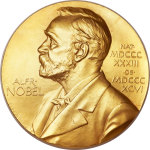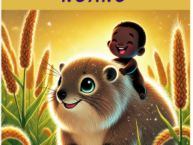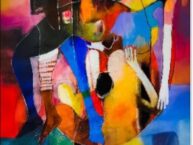 Every year the African continent holds its breath as we wait for the announcement. We’ve blogged the stories, Googled the authors, engaged in furious debate about the style of writing, about the story, about the author. Then the tweet drops, the website is updated and we all find out who won the Caine Prize.
Every year the African continent holds its breath as we wait for the announcement. We’ve blogged the stories, Googled the authors, engaged in furious debate about the style of writing, about the story, about the author. Then the tweet drops, the website is updated and we all find out who won the Caine Prize.
The Caine is the most prestigious award that an African can win. It translates to real prize money, recognition, and renown, the staples of success for any author anywhere in the World.
Last year, those who were interested were treated to an interesting conversation about the Caine prize. Prominent blogger, Ikhide Ikheloa, and celebrated author, Binyavanga Wainaina, engaged in a debate about the relevance of the Caine Prize to African authors. Interested parties stayed glued to their cell phones, madly retweeting and favoriting what was said, but it uncovered something uncomfortable that we have decided to ignore – in the eyes of African readers (and the rest of the World), the non-African prize legitimizes the the nominated African authors.
Legitimacy is the act of being legitimate, of being lawful or in accordance with rules, principles, standards. Legitimacy imbues honor and respectability that would have not otherwise been bestowed upon the person in question.
For example, a degree from an accredited (legitimate) University renders a person legitimate. Said person has acted in accordance with certain rules, principles and standards, as set out by the University, and can present their certificate of legitimacy in order to acquire a job.
The Caine prize has done this for the authors who have either been nominated for the prize or have won it. The legitimacy bestowed upon the author is one that is respected by the buyer looking for books on the shelf or surfing for their next read on Goodreads or Amazon. This particular fact is hard to dispute. It may not translate into millions of dollars in sales, but it provides an air of respectability and authority.
This is not a critique of the Caine prize. It was set up by someone who was interested in reading literature that was coming out of Africa and awarding excellence. This was not a bad thing to do. It has highlighted good written work by African authors who would have otherwise not been able to take their rightful place on an international stage.
The problem with the Caine prize has nothing to do with the prize or the people who sit on the juries, or those who administer the prize. Indeed it is easier to point the finger at the “outsider” rather than looking at our own issues with legitimacy.
I would like to acknowledge that non-African prizes for African literature written in any language have proven to be problematic. In 2006, Jose Luandino Vieira, an Angolan author refused to accept the most prestigious prize for Africans who write in Portuguese, citing personal and intimate reasons, which have been speculated to be the result of the apartheid regime in Angola, perpetuated by Portugal. This is also seen in authors from Algeria where there has been a long history of raging against Francophone literary prizes
But let’s get back to legitimacy. The World in which we live is centered around the notion of legitimacy. What expertise can you prove in order to speak or act on particular issues? Who has noticed your work? Where is your proof? All these questions demand confirmation; they demand legitimacy.
This is the struggle in which we are locked, collectively as Africans who love African literature and those who create African literature. Legitimacy, honor, and respectability. Unfortunately, it seems that the only legitimacy we recognize is that which is provided by non-African prizes.
In an attempt to engage African readers of African literature in any conversation about literary prizes, two major prizes float to the top. The Nobel Prize for literature and the Caine Prize. There does not seem to be any recognition of literature that has gained the notice or praise of African literary prizes. The recently awarded Etisalat prize barely passed with a whimper, and mentioning the inaugural Jalada Prize for African Literature brings the cicadas and crickets out. Do we even know if there was another winner of the Kwani Manuscript prize?
Why? Why is it that African prizes get such little notice? Shall we blame this on the media in an age where we get our news from blogs, twitter, and facebook? Are they responsible? Do we blame the award administrators themselves because their press conferences and media coverage is insufficient to reach our television sets? Who do we blame for the collective apathy towards African prizes for African literature?
And yet, like crabs in a bucket, we will climb over each other to craft stories written to satisfy the non-African gaze. We still explain our burial practices, our marriage ceremonies, our cultural shock in foreign lands, our corrupt leaders, our trip to the witch doctor, painting caricature after caricature in an effort to find the magic formula that will snag the elusive prize. Crafted, not for the consumption of our neighbours, or a young cousin struggling with the ravages of puberty, or to create a hero for children to emulate, but for the enjoyment of the non-African.
Again, I would like to stress that this is not the problem of the non-African. This is a symptom of our own underlying prejudice towards those things that are non-African in nature. African authors tell other stories all the time. Those that catapult them to international fame are, intentionally or otherwise, honed to satisfy non-African gaze which has proven to be biased or problematic.
For the struggling author, toiling in obscurity in their parents’ home, working late into the night to complete a manuscript for publication, reading rejection letter after rejection letter, the non-African literary prize becomes the holy grail. Proof to all and sundry, that their chosen profession, their passion, is legitimate.
Tackling the pricklier issue is much more difficult. The non-African gaze. Dr. Joy DeGruy, a well respected sociologist and psychologist in the United States of America, has studied the effects of cognitive dissonance and post traumatic slave syndrome in the relationship between the descendants of Africans and those of the Europeans. Much of what she says is applicable to the relationship between Africa and their former colonialist masters.
Without realizing it, we hold biases within ourselves about the value of the African gaze versus the non-African gaze. This is not an issue that is comfortable to talk about because none of us want to be accused of biases against our own people. To solve the clashing contradiction of our own thoughts, we engage in behavior that justifies our stance. Something else must be wrong. The media is not telling us anything. The award administrators are not working hard enough to publicize their award. Anything to satisfy the dissonance bothering our conscience. This is the result of years of colonialism spoken about in great talks, such as Chimamanda Ngozi Adichie’s Commonwealth speech that did not get quite as many “likes” or “shares” as her TED talk did.
The characteristics attributed to us (lazy, corrupt, hyper sexual, child-like minds, unable to feel pain or grieve) have seeped into our own perceptions and have given rise to the notion that non-African prizes awarded to African fiction imply that the work is superior. Without conscious thought, we have relegated the African to the last place, the last position.
Healing must come from ourselves; recognition and acknowledgement that we have been affected by colonialism and colonialist thought. Then we must begin the tough journey of reclaiming pride in ourselves, in our ability to be equal players in a field previously dominated by others without the need to have them legitimize our work. We must value ourselves, our words, our culture, our humanity, and each other.
In order for us to provide our own legitimacy, create the market where African authors thrive, we (Africans) must acknowledge our own creators by providing them with the means to create more. This will be evident when bookstores in Africa finally stock literature from all African countries, when we are able to provide precursors to dreams for future generations and when the question about the Caine or Nobel or Commonwealth ceases to take prominence in our discussions.
In celebration of awards given by us, for us, here is a brief list of some of the African literary prizes awarded to African writers of literature.
- Jalada Prize for Literature
- Jomo Kenyatta Prize for Literature
- Lotus Prize for Literature
- The Maskew Miller Longman Literature Awards
- MNet Literary Awards
- Naguib Mahfouz Medal for Literature
- Nigeria Prize for Literature
- Noma Award for Publishing in Africa
- Wole Soyinka Prize for Literature in Africa
- The Writivism Short Story Prize Summary of the conversation between Ikhide Ikheloa and Binyavanga Wainaina. http://brittlepaper.com/2014/10/ikhide–ikheloa–binyavanga–caine–prize–cainerversation/Jose Luandino Vieira refuses Portugal’s top literature award https://youtu.be/XRQ–Ci6LwVwChimamanda Ngozi Adichie, Commonwealth Lecture 2012 https://youtu.be/vmsYJDP8g2U
- Post Traumatic Slave Disorder, by Joy De Gruy Leary
- http://www.booktrade.info/index.php/showcomments/8707
About the Writer
Gloria Bwandungi Mugarura is a story teller and a passionate advocate for the spreading of African literature World wide. Her days are spent looking after her garden, taming her obsession for organized spaces, baking, making meaningful connections with other African writers, and writing.



1 comment for “African Literary Prizes, Legitimacy, and the non-African Gaze by Bwandugi Mugarura”